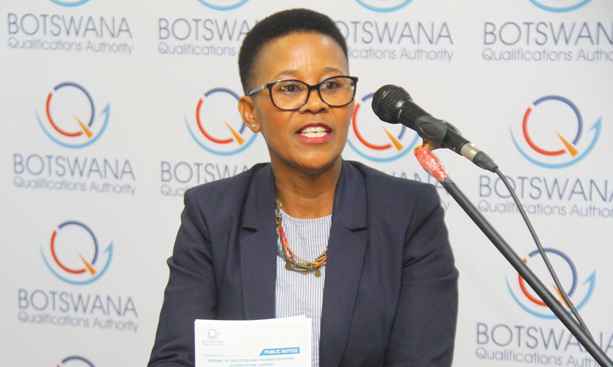Botswana Qualifications Authority’s (BQA) transition from the old tertiary education accreditation framework to the new systems is currently progressing well following the successful completion of the phase one of the development. BQA was established in 2012 taking over from the Botswana Training Authority with the sole mandate of improving quality of education and training locally as well dealing with National Credit and Qualifications Framework. BQA started implementing the regulation in January 2017.
The transition is divided into three phases with the first phase being Education and Training Provider (ETPs)registration and accreditation which just completed in December 2018.Qualification registration is currently in full swing and is expected to end in December 2019 while the last phase which is Learning Programme accreditation is set to conclude in December 2020.
With the phase one of the transitions already down, 28 tertiary institutions have been registered and accredited as Education and Training Providers. From this list 16 are private institutions while 12 are public institutions. Three private tertiary schools and nine public schools are in the process of registering and accrediting while only one institution has not yet applied for the process to be accredited as an ETP.
According to BQA Communications and PR Manager Selwana Pilatwe-Koppenhaver the transition of the sub-framework is going on well considering that most institutions have meet the transition plan or deadlines. “There were 45 ETPs under Higher Education which needed to be transited to the current status. One higher education provider has not yet applied for registration and accreditation and one has been rejected. In this case these providers are not allowed to enrol new learners and are monitored to teach enrolled learners until they complete their courses of study and graduate with recognized qualifications. The three institutions that were discontinued: two had no enrolled learners and were de – registered by the owner and the other moved to the Technical and Vocational Education and Training sub-framework (will offer courses up to certificate level and not higher),said Koppenhaver.
According to Koppenhaver the last two phases have already commenced and there is positive progress as the Authority has currently registered 21 qualifications on the National Credit and Qualifications Framework while Accreditation (NCQF) of learning programme has since started because there are qualifications on the NCQF which are valid for offer. “Registered qualifications became national qualification and can be used by all providers to develop learning programmes for accreditation. The Authority has developed strategies, in consultation with stakeholders to fast track this process. One such being establishment of Cooperative Development of Qualifications. In this approach submitted qualifications of the same domain will be grouped and developers will work together to merge insignificant differences and submit one jointly developed qualification for registration. This will ensure water tight industry relevant qualifications. It will also minimize processing of duplicate qualifications and promote development of diverse ones,”she said.
In the past years local tertiary institutions have been bedeviled by problems of unaccredited courses, something which forced students to revolt and embark in strikes and demonstrations. The latest being the 2016 Botho University strike in which students complained of unaccredited courses as well poor equipments. However this new system by BQA has been seen as welcome development since it has quelled issues of unaccredited courses and suppressed the emergence of fly by night tertiary schools which are normally not well registered but just set up to gobble funds from government sponsored students.
